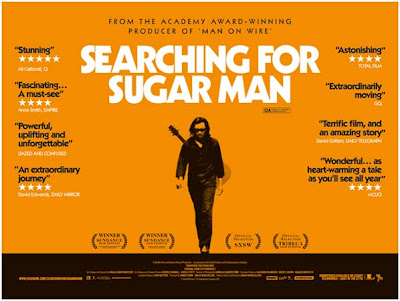This space is dedicated, more than anything else, to the average moviegoer who doesn’t spend countless hours a week watching movies and keeping up with industry information but simply wants a bit of knowledge before walking in unaware to a given movie. As such, I usually go out of my way to avoid any potential spoilers. Between trailers and the plethora of information available at the touch of a smartphone, it’s difficult enough to successfully navigate the spoiler-free world of movies and TV without me adding to the issue. Certain films, however, are fundamentally impossible to properly discuss and dissect (and therefore review) without throwing in a spoiler or two. Such is the case with Searching for Sugar Man. Now, I knew the “spoiler” I’m about to delve into going into this film and it certainly didn’t hinder my experience. But even still, this is an outstanding documentary that I will be encouraging everyone to see and if you feel a story-related spoiler would damage your ability to enjoy it, please read no further. You’ve been warned.
In 1971, folk-rock musician Sixto Rodriguez released his second and final American album on Essex Records out of Detroit. Upon selling literally no copies of the record, Rodriguez was dropped from his label and began a short existence as a struggling artist in the bar scene, a role that didn’t suit him, and subsequently led to his on-stage suicide. A complete failure on American soil, somehow Rodriguez’s debut album, “Cold Fact”, found its way to South Africa and became a huge sensation to a country deeply divided by the apartheid. Before long, Rodriguez’s songs became an anthem of sorts for the lower class of South Africa and the middle class who supported the end of the apartheid but lacked a rallying cry. The Rodriguez albums became more and more popular, making him bigger than Elvis or The Beatles in South Africa though almost nothing was known about the man. In the late 90s, a pair of Rodriguez fans, Stephen Segerman and Craig Bartholomew-Strydom, sought to find out more about their hero and what led to his untimely demise. Through a string of strange events and many months of searching for information, the pair finally broke their story wide open when they were put in touch with Rodriguez, alive and well, making a living as a construction worker in Detroit.

The story told in Searching for Sugar Man is one that would be deemed completely unrealistic if it were presented in a scripted drama. Stuff like this just doesn’t happen, even if many of the events took place before the Internet boom. First of all, when you hear the songs Rodriguez penned for his two albums (spliced in continually through the course of the film), you find yourself completely shocked that the guy didn’t make it here. Every record producer or former collaborator dug up by director Malik Bendjelloul goes above and beyond in praise of Rodriguez, all of them vexed as to why he never made an impact on the American charts. His songs are reminiscent of the best of Bob Dylan, a soulful bluesy brand of folk that pulls no punches in the writing and is backed by a rich, unique voice. Second, the myth of what became of Rodriguez and his on-stage death was so widely believed as to become written into the history books as fact. Everyone beyond the handful of people actually connected to the man knew him to be dead. And third, the way in which this one man, of all the bands and musicians from the era, became such an enduring sensation in a foreign country, completely unbeknownst to him or really any of his inner circle, is nearly beyond belief. Again, stuff like this just doesn’t happen.
The back half of the film centers on the rediscovery of Rodriguez and his return to the stage in 1998. Footage from his six night concert series in South Africa shows Rodriguez to be a proficient, comfortable performer who was in no way intimidated by the throng of adoring fans that flocked to the arenas. Even if Searching for Sugar Man was a complete miss in every department, it would still be worth the price of admission if only to see the reaction of the fans in the packed house when their hero, long believed to be dead, took the stage for the first time. It compares to Beatlemania, Bieber Fever, or any other music-related madness that has gripped a nation. Inserted in amongst the concert footage and the interviews with adoring fans and collaborators are moments with Rodriguez and his three daughters, all of whom paint the same picture of their father as a simple man who never needed the spotlight but nevertheless graciously accepts it and thrives in it. At the time of filming, Rodriguez was still working in the construction industry despite having to take occasional leaves of absence to play sold out shows across the ocean. It is an almost unbelievably surreal life that Rodriguez lives and yet it seems entirely reasonable to the man and his kin.
From a filmmaking standpoint, Searching for Sugar Man isn’t flawless. Much of the post-production value seems a bit dated or perhaps cheap and the built-in drama of what became of Rodriguez didn’t completely work for me, though it did for others in my party. Nevertheless, the story is such an engrossing one as to make up for a multitude of sins and Bendjelloul does a masterful job of mixing the interviews with his subjects in order to make Rodriguez’s tale a cohesive, multi-faceted one complete with humor, tears, and a sense of sheer wonderment. This is a triumphant film that deserves the award attention it is sure to get and one that I hope many of you will seek out.

